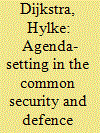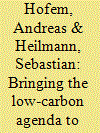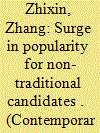|
|
|
Sort Order |
|
|
|
Items / Page
|
|
|
|
|
|
|
| Srl | Item |
| 1 |
ID:
116683


|
|
|
|
|
| Publication |
2012.
|
| Summary/Abstract |
The European Union (EU) has launched an impressive number of crisis management missions since its Common Security and Defence Policy became operational in 2003. This article analyses the agenda-setting phase of these civilian and military operations in order to explain why the EU has sent troops, policemen, judges, prosecutors and monitors across three continents. It presents an institutionalist perspective and argues that the former High Representative Javier Solana and his officials have been instrumental in putting various operations on the agenda. They have employed deliberate agenda-setting strategies, such as venue shopping, conflict expansion and issue framing, to further their bureaucratic interest of launching new missions. Solana and his officials had the ability to affect the agenda-setting process thanks to their pivotal position in policy making. This gave them with superior information on the state of play and an early mover advantage as well as strong international networks. The article provides empirical evidence from the crisis management missions in Aceh, Bosnia, Chad and Kosovo. It concludes with the changes to the Common Security and Defence Policy after the Treaty of Lisbon.
|
|
|
|
|
|
|
|
|
|
|
|
|
|
|
|
| 2 |
ID:
120111


|
|
|
|
|
| Publication |
2013.
|
| Summary/Abstract |
This study traces the transnational interactions that contributed to introducing the low-carbon economy agenda into Chinese policymaking. A microprocessual two-level analysis (outside-in as well as inside-access) is employed to analyse transnational and domestic exchanges. The study provides evidence that low-carbon agenda-setting - introduced by transnational actors, backed by foreign funding, promoted by policy entrepreneurs from domestic research institutes, propelled by top-level attention, but only gradually and cautiously adopted by the government bureaucracy - can be considered a case of effective transnational diffusion based on converging perceptions of novel policy challenges and options. Opinion leaders and policy-brokers from the government-linked scientific community functioned as effective access points to the Chinese government's policy agenda.
|
|
|
|
|
|
|
|
|
|
|
|
|
|
|
|
| 3 |
ID:
120146


|
|
|
|
|
| Publication |
2013.
|
| Summary/Abstract |
In this article an integrated framework of agenda-setting is proposed that incorporates the two main accounts of agenda-setting: the information-processing approach by Comparative Agenda Project scholars and the preference-centred account advanced by Comparative Manifestoes Project scholars. The study claims that attention allocation is determined at the same time by preferences, information and institutions, and that attention allocation is affected by the interactions between these three factors. An empirical test is conducted that draws upon a dataset of parliamentary questions/interpellations in Belgium in the period 1993-2000. It is found that attention in parliament is indeed driven by preceding party manifestos (preferences), by available information (media coverage) and by institutional position (government or opposition party). The evidence establishes that agenda-setting is also affected by the interactions between preferences, information and institutions. Actors, given their preferences, treat information in a biased fashion, and institutions moderate information's role.
|
|
|
|
|
|
|
|
|
|
|
|
|
|
|
|
| 4 |
ID:
142817


|
|
|
| 5 |
ID:
120145


|
|
|
|
|
| Publication |
2013.
|
| Summary/Abstract |
Recent studies have drawn attention to the political contingencies of the media's political agenda-setting influence, finding, for instance, that issues from the media agenda are more likely to attract attention if a party enjoys ownership of the issue. Supplementing the debate on why political parties respond to news, it is argued in this article that ownership is only part of the picture and that policy responsibility, together with news tone, constitutes a stronger explanation of news politicisation. Opposition parties respond to bad news because they reflect negative developments in social problems for which the government could be held responsible. The government responds to good news that reflects positive developments in social problems because this could politicise policy success, but is also forced to react when news explicitly address government responsibility and thereby threatens its image as responsive and competent. Furthermore, it is shown that news tone and policy responsibility condition the incentive to politicise owned issues from the media agenda. Thus, opposition parties will not politicise owned issues when news is good because this could draw attention to government success, while government is unable and unwilling to prioritise owned issues when news is bad and instead is likely to make use of its ownership strengths when news is good and the pressure to respond is low. The arguments are tested on a large-N sample of radio news stories from Denmark (2003-2004). Opposition response is measured through parliamentary questions spurred by the news stories, while government response is indicated by references to these stories in the prime minister's weekly press meeting. Results confirm the expectations, suggesting that parties care more about the tone of news stories and the type of attention they might produce, rather than what type of issues they could serve to politicise.
|
|
|
|
|
|
|
|
|
|
|
|
|
|
|
|
|
|
|
|
|